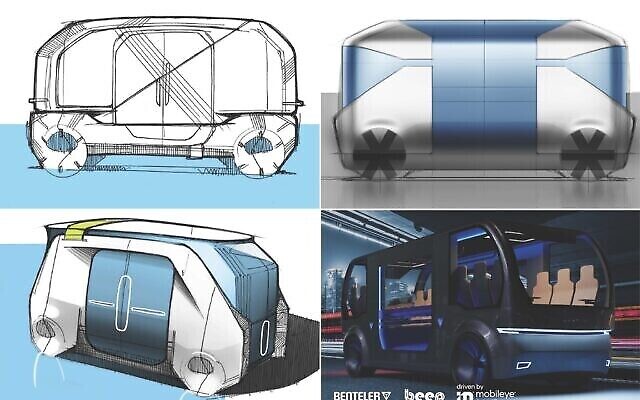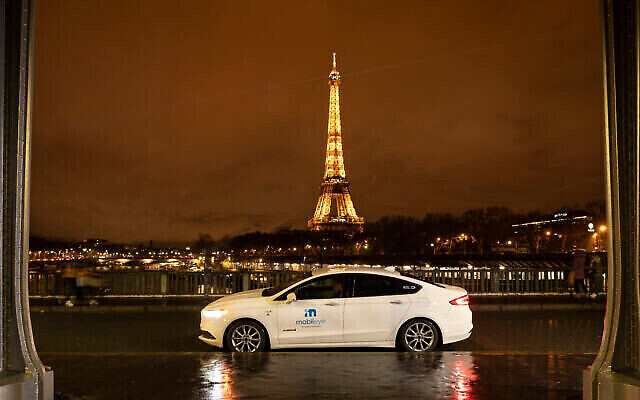Jerusalem firm to launch self-driving shuttles
Intel subsidiary teams up with German EV maker and US transport software developer to roll out project

JERUSALEM-based autonomous driving systems company Mobileye, an Intel subsidiary, is partnering with two mobility firms to develop and deploy self-driving, fully electric shuttles in the United States in 2024, the company said this week.
The multi-passenger shuttles will serve public and private communities across North America and are aimed at first- and last-mile use cases (the first and last legs of a journey) in urban areas in two years, according to an Intel announcement Tuesday.
Mobileye will be working with German electric mobility unit Benteler EV Systems, and Florida company Beep Inc., the developer of a software solution that allows mobility customers to offer scheduled and on-demand transportation services. Beep has operations in Florida, Georgia, and Arizona.
The electric shuttles will be powered by Mobileye’s self-driving system, Mobileye Drive, a solution that offers advanced vision sensing technology and an expansive, crowd-sourced mapping technology that creates high-definition maps of road infrastructures worldwide.
The partners will deploy a fully autonomous (Level 4) electric vehicle that’ll meet the safety standards for public road use. Level 4 provides high automation without the need for human intervention in limited areas (also known as geofencing), but humans can still manually override if necessary.
Johann Jungwirth, vice president of Mobility-as-a-Service at Mobileye, said “working with Beep and Benteler, Mobileye aims to mass-produce first- and last-mile self-driving mobility solutions that will enable the convenient, accessible and safe movement of people across North America.”

“Multi-passenger micro-transit needs are ever-increasing in our cities and towns globally and must be addressed in order to reduce road congestion, protect the environment and provide safe, reliable mobility for all to access,” explained Hinrich Woebcken, advisory board member for Beep and former CEO of Volkswagen North America.
Benteler will develop the vehicles and undertake production in the US, “with the ambition to roll out the mover to other countries,” the announcement read.
“These movers need to be robust for 24/7 public or commercial use, at optimized costs and with excellent riding comfort,” said Marco Kollmeier, managing director of Benteler EV Systems.
Mobileye rides, shuttles, and delivery vehicles
Mobileye is currently testing its self-driving technology and piloting autonomous “robo-taxis” for on-demand rides in cities across the world including Paris, Detroit, New York City and Tokyo, as well as Tel Aviv and Munich, where Mobileye is set to launch autonomous taxis and ride-hailing services later this year.
Mobileye began testing autonomous vehicles in Munich in 2020, after obtaining an AV testing permit recommendation from the country’s independent technical service provider TÜV SÜD. It was the first city in Europe to approve the pilot, which built on Mobileye’s existing program in Israel, where the company has been testing self-driving vehicles since 2018.

Separately, Mobileye has a number of running partnerships to supply self-driving systems to California delivery startup Udelv, which plans to have a fleet of autonomous delivery vehicles on the roads within two years, and with two French-based firms to jointly develop and deploy commercial autonomous shuttles for public transportation services in Europe in 2023.
Intel said in December that it plans to take Mobileye public this year at a valuation of approximately US$50 billion. Intel bought Mobileye in 2017 for over US$15 billion, and it remains the biggest tech exit to date for an Israeli company.
Earlier this week, Intel announced the forthcoming acquisition of Israeli firm Tower Semiconductor, a chip and semiconductor manufacturer based in Migdal HaEmek.
The purchase will boost Intel’s semiconductor manufacturing abilities to meet demand from global customers, the chipmaker giant said.
Tower makes analog semiconductor chips for the consumer, industrial, automotive, mobile, infrastructure, medical, aerospace, and defense sectors.
Intel also bought Israeli company Screenovate, a developer of beaming and mirroring solutions for mobile devices, last December, as well as artificial chipmaker Habana Labs in 2019, and transit tech company Moovit in 2020.
Intel bought Replay Technologies, a developer of 3D reconstruction technologies for large-scale sports events, in 2106, but shut it down earlier this year.
Times of Israel

comments